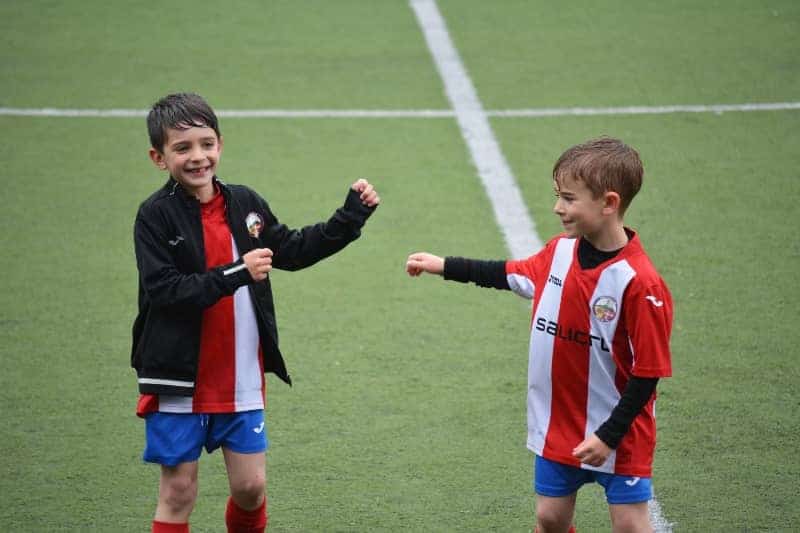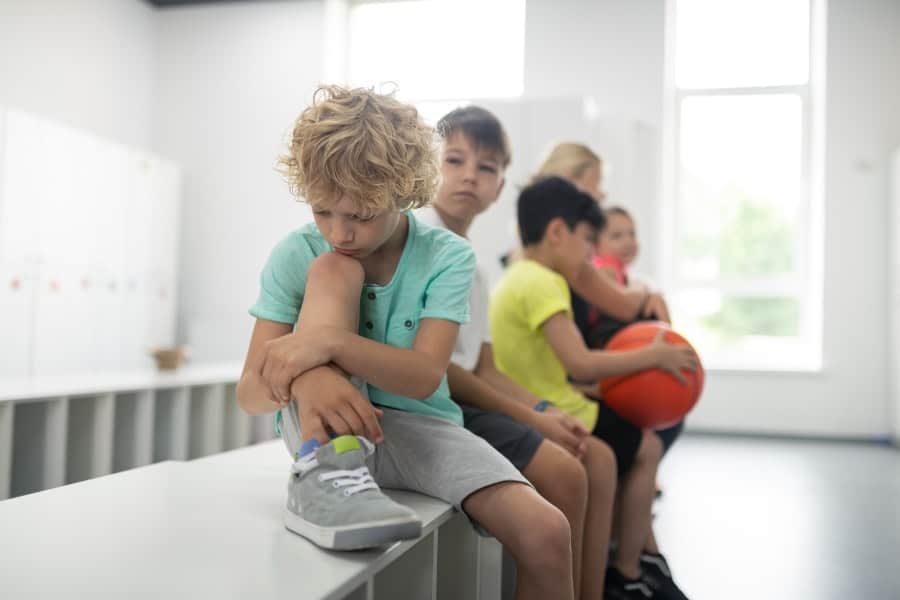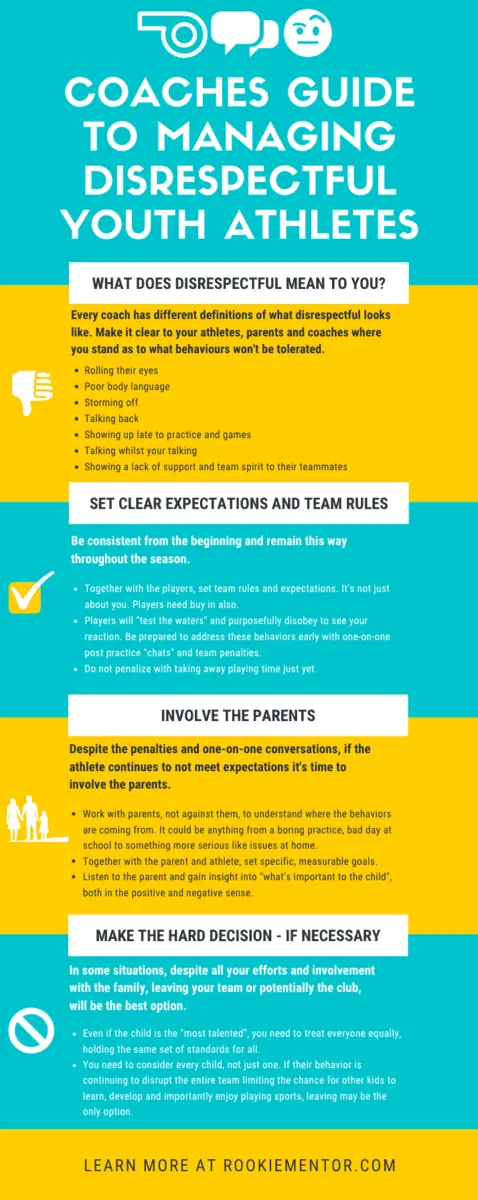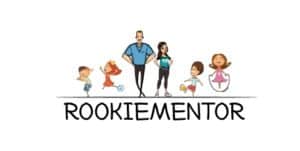Eye rolls, bag throwing, talking whilst your talking, yelling at teammates and purposefully disobeying team rules make for a challenging job as a youth sports coach. So how do you manage these disrespectful young athletes, even if they are your best player?

How to manage disrespectful youth athletes. The first step is to set clear, concise expectations and team rules. If violated, team penalties may be applied. If the behavior continues, the child’s parents needs to become involved where details can be shared and a clear plan of action can be discussed together.
Throughout this post, you will find a helpful coaches guide to managing disrespectful youth athletes. While a lot of these kids may have complex backgrounds, your mission as coach is to be as transparent and fair to all the children, not allowing the “naughty one” to dominate your time and ruin the experience for everyone else. This takes empathy and poise but at the same time, consistency and perseverance. It’s an intricate balance and we want to show you what that looks like in reality.
Important Note Regarding Managing Disrespectful Youth Athletes
Not all coaches will title particular behaviors as disrespectful.
Some coaches may be okay with athletes talking back and “arguing their point”, while others won’t tolerate it. Some coaches will be okay with kids sulking when they get “benched” while others will deem that as poor sportsmanship and rude.
This can be really confusing for young athletes to understand where their boundaries are.
So you need to very clear, like super duper clear about what you deem as disrespectful behavior. Make sure all your coaches are on the same page about what these behaviors look like to maintain consistency and stop the “good cop/bad cop” mentality occurring.
I wanted to list some potential disrespectful behaviors below. I want to do this, not to point of the obvious and bore you to tears, but highlight variations from coach to coach regarding their threshold for disrespectful behaviors.
- Rolling their eyes
- Whispering their opinion to their friends after you have explained a drill or activity
- Arms folded, sad face and slumped shoulders when being put on the bench
- Throwing their bag and equipment in a tantrum when something doesn’t go their way
- Storming off
- Talking back when you are coaching them one-on-one
- Showing up late to practice and games when you explicitly stated a time you wanted everyone to arrive
- Talking whilst your talking
- Communicating badly to their teammates showing a lack of support and team spirit.
Take away: Be consistant and VERY clear about what specfic behaviours are rude and disrespecful. Don’t assume the kids and other coaches are on the same page.

Be Consistent From The Beginning
At the start of the season, even before the very first practice, call a meeting with your coaches, parents and the young athletes. It gives you the opportunity to firstly “meet and greet” the kids and their families but it also gives you the chance to set clear expectations and team rules.
Use this moment to invite the kids to be part of setting the team rules.
After all, they are called team rules and not coach X’s rules. Having the kids contribute, in my experience, leads to greater unity and buy-in particularly if your team loses a few games in a row or somebody gets injured throughout the season.
We talk more about this meeting and what exactly it looks like in a post we wrote titled, What are the Challenges of Coaching Youth Sports? It’s full of other “bumps in the road” you may encounter as a youth sports coach with some helpful strategies to overcome them.
It’s interesting, during this meeting you may already see who your potential “red flags” could be, being both parents and players. But don’t react yet even if you’re infuriated. Just have this information and mental notes handy and keep observing what happens.
Okay, once practice begins it’s your job to continuously emphasis these team rules and your own expectations to all players and coaches.
If a player displays disrespectful behavior that goes against the team rules you need to be firm in your response to make this very clear it won’t be tolerated. These young players could be “testing the waters” to see just how strict you are.
And this is pretty normal behavior. We adults do it too. Think about it, you start a new job and you may be a few minutes late. You look around to see if you get told off or pulled into the office. If you don’t, you probably continue to “not stress about being late” because the issue wasn’t addressed early.
As coaches, we need to address these issues and find out what the problem is very early into the season.
Let them understand that you have a place in this team but your bad behavior doesn’t.
Talk to them after practice in a public place but away from being within earshot of other kids. Highlight they are not meeting the expectations or team rules and there will be consequences if it continues.
Then invite them to tell you what the problem is. They may complain about a drill being boring and they may comment on another child’s ability. But they also may say nothing at all. Listen. Really listen, staying calm and composed because the fix could be simple. Maybe...
To get the juices flowing in uncovering the cause, here are a few reasons why kids act out during your sessions and at games:
- Expectations to perform. “Mom” or “dad” were prominent sports stars back in their day and they need to be at that level.
- The thought of a future scholarship to a dream college
- They are testing to see your level of support and love from a coach’s perspective.
- They simply had a bad day
- Troubles at home
- They are bored and not stimulated
- You don’t live by your own rules and it’s contradicting.
- Huge pressure to support their family in the future if their home life is financially challenging. They probably won’t tell you this but could be something you pick up on.
“It is a normal part of this age to test and push the limits of those with authority over them – parents, teachers and yes, soccer coaches too”.
US Youth Soccer
Quick Coaching Tip:
Are your kids acting out because they are bored at training?
I recently read a great tip from US Youth Soccer called, “avoiding the three L’s”.
- Laps
- Lines
- Lectures
And I think it’s absolutely brilliant!
Be open-minded to alternating and changing your training plan. Avoid continually making the kids run boring laps, forcing them to wait in a line before it’s their turn and finally, allow the kids to spend more time playing over listening to you talk. Education is important of course but keep the balance in check.

Practice
If you have a disrespectful youth athlete in your practice session, one of the most simple methods is to have a team penalty as a consequence for their behavior.
I know some coaches will disagree with this method but I stand by it.
I have been both on the “naughty kid end” and on the receiving end when I have done nothing wrong and have been made to run laps. Peer pressure is incredibly powerful. If you are the child misbehaving, causing your teammates to run, they’ll look at you with those pull your socks ups because I am not doing that again eyes and I bet you it has an impact.
As for the child who has done nothing wrong, it does suck. No doubt about it. But it creates something powerful amongst teammates because suddenly it’s so much more about the team than the individual performance. Kids start to encourage each other and not entertain or laugh when somebody does something disrespectful because it goes against the team rules.
Usually, the need to enforce these team penalties are short-lived because kids start to see a consequence for their actions, modifying their behavior.

But What if The Disrespectful Behavior Continues?
Do you take away playing time because you’re mad, frustrated and it will “teach them a lesson”? I wouldn’t recommend it just yet and here’s why.
If you turn around and bench a child for half the game without warning, how do you think their parents will react? They have no idea why all of a sudden you’re not playing their child. They will be confused and probably angry because at the start of the season you explicitly said that all kids will receive equal playing time regardless of “natural talent.” Throw on top the fact they have paid expensive registration fees and bought equipment especially for this sport.
And now you turn around and do this? Talk about breaking the team rules.
Before making any decision like reducing playing time, you need to have all the facts and transparency with everyone involved.
These kids are minors and they will have bad days. They are still learning who they can trust and who they can’t. Just because you invited them to tell you what the problem was at the very start of the season doesn’t mean they did. You don’t know how they were treated by other coaches who they were honest with and you certainly, at this point, probably don’t know a lot about their home life.
So, if the penalties at training are not effective and they are still not meeting expectations, it’s time to involve the parents.
Involve their parents
Meeting the parents can be intimidating for everyone involved but it’s essential for the benefit of the entire team.
But you might be asking, at what time should I speak with mom and dad? Is it a time thing? Like, if they act out for three weeks that’s the cut off? Or is there another turning point?
While time can work because it’s measurable, personally, I like to use my own judgment. If the behavior is consistently negative and continuously goes against the team rules, a conversation with the parents is always encouraged earlier rather than later.
The purpose of the meeting with both the parent and child is twofold.
You’re making it clear that this behavior is unacceptable and it’s disrupting the chance for other kids to enjoy sports and secondly, you’re trying to understand where this behavior is coming from. What is going on at home which can be causing this child to act out? Are they being bullied at school? Are they struggling with friends?
While finding out this information doesn’t make it acceptable, it allows you to potentially coach using different strategies. Try not using a whistle as one.
You want the parents to buy-in to what you are trying to do. You want the positive messages you are setting at practice to be relayed and reenforced at home.
The final part of this meeting is to work out a plan all together regarding their behavior and what happens if it continues. Are they okay with you limiting their playing time or sitting them out for a game? Do they support this method in the hope their disrespectful behavior will stop?
A strategy here is to put particular rules in place for the specific kid with the involvement of their parents. These rules must be for the child only and measurable so direct feedback can be given. Does the child talk back, do they sulk on the bench? Be specific. It’s important your message is not simply, “act better” or stop misbehaving.” This makes it easier to acknowledge improvement and reward good behavior.
Remain positive in the possibility of turning things around for this child. You are not giving up on them. You want them to succeed both right now and as an adult.
Dan spoke in a previous post titled, How Beginner Youth Sports Coaches Can Earn Player Respect, about having an open-door policy and I couldn’t agree more. Take a look at this post to find out what that means.

If You Still Can’t Reach a Resolution
In some situations, despite all your efforts and involvement with the family, leaving your team and potentially the club will be the best option.
This conversation can involve higher authority, such as a club director or president, but often these roles are not filled in smaller sports clubs, forcing you to make the decision together with the assistant coaches, in the best interest of all kids.
Though this situation is less than ideal, you as coach need to understand the whole situation. The rules and expectations you and the entire team set at the start of the season are for the benefit of each and every member of the team, not just one. Their behavior is continuing to disrupt the entire team limiting the chance for other kids to learn, develop and importantly enjoy playing sports.
If the parents appear dissatisfied with this decision, consider refunding the registration fees of the child to limit the financial burden on their family.
What About the Best Kid on the Team?
It can be tempting to treat the “better kids” with more leniency in regards to their behavior when they are putting scores on the board. Let’s face it, if you don’t play these players the most minutes, sit them out for back chatting or ask them to leave your team altogether, you’ll probably lose.
Well, in the beginning anyway. Until the other kids in the team finally have a chance to see their own potential.. but that’s another story.
But the thing about youth sports is, which I’m sure you don’t need a reminder, it’s not about what’s on the scoreboard.
Yes, winning is part of the process, teaching resilience and hard work, but it’s not the whole story. Dan wrote a post titled, Is Youth Sports Too Intense? A Message For Our Coaches which explores this idea and is worth a read.
It’s imperative that each and every kid is treated exactly the same in regards to playing time, responsibilities and “having a go” in a variety of positions. The kids who are clearly naturally talented will be noticed as they grow and develop so don’t think they are missing out on scouts when they are 7-years-old.
The same rules and penalties need to apply for every kid, even if you get bad looks from mom and dad.
Related post: Obnoxious Youth Sports Parents: Your Role As Coach
[VIDEO] – Can you bench the best players due to bad body language and being disrespectful? Yes, even in women’s college basketball according to their coach. I like this strategy.
Coaches Guide to Managing Disrespectful Youth Athletes – Infographic
Pin to Pinterest for later

Summary: Coaches Guide to Managing Disrespectful Youth Athletes
Having a consistent, fair approach to each and every player throughout the entire season is critical to “having a leg to stand on” when a particular player starts showing disrespectful behavior.
Be very clear in your communication with parents and the club to fully understand the situation to hopefully turn things around.
Most kids will respond to this firm but fair strategy, though there will be some which won’t ever buy into what you’re trying to achieve. Don’t be disheartened and focus on being the best coach and mentor for the kids who do respect the team rules and live up to the expectations.
How do you manage disrespectful youth athletes in your teams?
Cheers,
Emma
